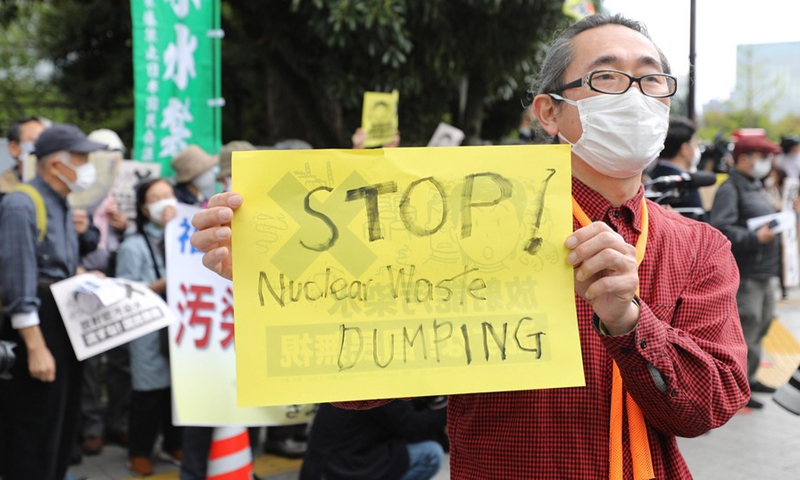China is not obliged to cooperate as Japan uses 'consultation' as a cover

People rally to protest against the Japanese government's decision to discharge contaminated radioactive wastewater in Fukushima Prefecture into the sea, in Tokyo, capital of Japan, April 13, 2021. Photo: Xinhua
On July 19, several Japanese government sources told the media that Japan has proposed to China the establishment of a so-called "consultation mechanism" involving experts and practitioners from both sides to discuss the issue of dumping nuclear-contaminated wastewater from Fukushima, but China has not responded to the proposal. Similar leaks have occurred before, mainly attempting to create a false impression in the international public opinion that Japan is constantly trying to communicate with China, while China is unwilling to engage, thereby diverting responsibility and attention onto China.
This is a tactic that Japan is accustomed to and quite skilled at employing. What is Japan's intention in proposing to establish a consultation mechanism with China? Is it to discuss and coordinate the disposal methods for the contaminated water, or is it to make China unconditionally accept Japan's dumping plan? If it is the former, we would certainly welcome it. However, if it is the latter, the matter needs to be reconsidered.
China does not refuse negotiations, but we reject using negotiations as a pretext. Meaningful negotiations should occur before Japan unilaterally decides on dumping the water. However, Japan did not conduct sufficient consultations with any neighboring countries or stakeholders involved before presenting the plan, disregarding everyone's concerns and opposition. Moreover, meaningful negotiations should involve different options, and decisions should be made based on the results of the consultations. But did Japan do this? It's imposing the dumping plan as the only option on all parties. Is that negotiation? Certainly not, and China will not cooperate with Japan's show.
Despite strong opposition from citizens of many countries, including Japanese citizens, the Japanese government's public relations efforts and the indulgence of the US due to geopolitical interests have resulted in some US allies and relevant international institutions adopting an appeasing attitude. This has made China stand out, which has been consistent on this issue. China's stance is consistent and clear: it requests that Japan should revoke its erroneous decision to dump the nuclear-contaminated wastewater into the sea with an attitude of being responsible for science, history, the global marine environment, the health of all human beings, and future generations, and Japan should handle the nuclear-contaminated wastewater in a scientific, safe, and transparent manner, and accept strict international supervision.
Japan is also taking "science" as an excuse. It adopted the report hastily released by International Atomic Energy Agency (IAEA) as a major shield. However, even the Japanese public is not convinced by the explanation their government is giving to the world. According to a survey by Kyodo News in Japan, 80.3 percent of the respondents found the government's explanation regarding the dumping of nuclear-contaminated wastewater into the ocean "insufficient," and 87.4 percent expressed concerns that the dumping could damage Japan's image.
True science must withstand scrutiny and questioning. The effectiveness and long-term reliability of Japan's nuclear-contaminated wastewater purification system have not been third-party certified, and there is no verification of the accuracy of the provided data. Moreover, there has been no genuine assessment of the long-term impacts of nuclear-contaminated wastewater on marine ecosystems, food safety, and human health. Leaving aside the technical aspects, when people question Japan's dumping plan based on common sense, Japan evades providing a clear answer. The question is simple: if Japan claims that the nuclear-contaminated wastewater is safe, even drinkable, why doesn't water-scarce Japan use it for domestic purposes like in agriculture and other crucial industries, rather than dumping it into the Pacific Ocean under tremendous pressure? Isn't this a huge waste?
Japan knows that China's position will not waver, and China will not engage in political bargaining at the expense of public interests. Japan seemed to believe that as long as it could gain the support of major Western countries like the US, China would have no choice but to accept it. As a result, Japan did not give enough importance to China's opinions. However, recently, Japan seems to have become more proactive, expressing its desire to "consult" with China. The direct reason for this change is that since July, China has strengthened its monitoring and inspection of radioactive substances in Japanese imports, leading to some Japanese seafood being detained at Chinese customs. This has made Japan anxious.
If Japan is genuinely willing to engage in negotiations, it should first announce the suspension of its dumping plan. Then, it should allow neighboring countries, Pacific island nations, and other stakeholders to conduct independent sampling and analysis of the nuclear-contaminated water. Japan should also be open to exploring alternative solutions. Before such actions are taken, China will take all necessary measures in a timely manner depending on the development of the situation to ensure the safety of Chinese consumers and firmly uphold the common interests of the Pacific region.
Photos
Related Stories
- Japan will fail in its 'whitewash' attempts
- On Marine Day, Japanese public decry nuke wastewater discharge
- Posters: Japan must not take IAEA report to shield its ocean discharge
- GCC, Japan resume FTA negotiations
- HKSAR gov't vows fresh ban on Japanese aquatic imports over nuclear wastewater discharge
- Report on Fukushima's nuclear-contaminated water regretable: IAEA working group expert
- Pacific Islands Forum expert panelist criticizes IAEA's report on release of Fukushima nuclear wastewater
- Fukushima fishermen remain opposed to releasing nuke wastewater after IAEA report
- Some countries' silence on Japan's discharge plan raises eyebrows
- S. Korean city to expand radiation test on fish ahead of Fukushima wastewater discharge
Copyright © 2023 People's Daily Online. All Rights Reserved.









